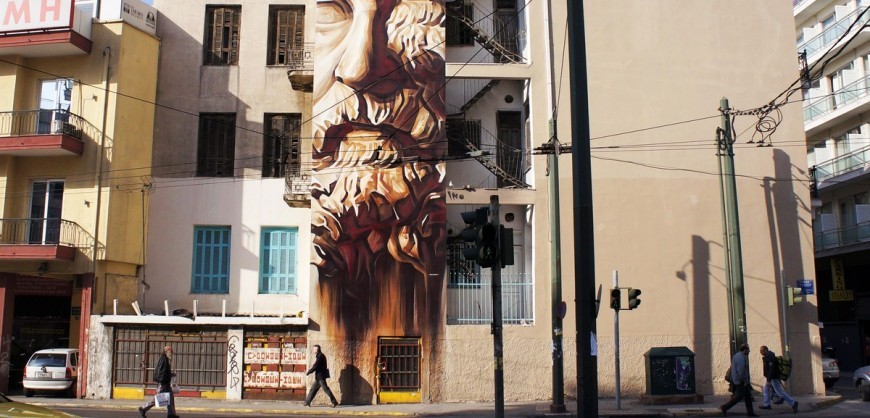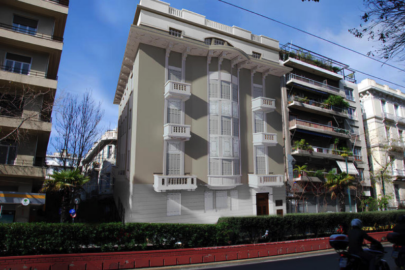Athens is the New Berlin has become a common press tagline recently. Vallejo Gantner, the former director of PS122, one of New York’s contemporary performance institutions and I, a Diaspora Greek arts manager, were in Athens in to see if the city is going through a creative regeneration.
Artists, collectives, new bars, farm-to-table restaurants, startups, and alternative music venues are amassing in Athens. Abandoned buildings, the scars from what Greeks simply call ‘the Crisis’ are turning to cultural spaces and startups. Political statements are now blazoning street art. Artists from Mexico, Bali, New York and Western Europe are making Athens a new base. Is Athens the New Berlin? No, it is Athens. But, something is happening.
Over 30m tourists visited Greece in 2017. According to the World Tourism and Trade Council, seven percent of Greece’s GDP $14.7bn USD is derived from tourism. 2017 will end as an “all-time record year for Athens tourism”, with more than five million visitors.
“The stories coming out of Athens, talk of new ideas in the arts, of start-ups, of a new pulse – is it real? Gantner asks.
Can Athens avoid the traps of gentrification? Worldwide there is a conversation around creative industry-driven economic urban rejuvenation– but in the medium to long term, it may ignore a host of negative outcomes.
“You see more from the outside, but it’s better that someone talks about you than you talking about it” says Nikos Trivoulidis the Development Manager of Benaki Museum.
Benaki museums include collections of Ancient Cycladic, Byzantine and Islamic Art as well as a new contemporary space.
“We are agents of change, we do not follow government agendas, and we’re independent,” Trivoulidis says.
Old money is coming back as shiny new cultural institutions. The Onassis Cultural Centre, a new €560 million complex includes a concert hall, theatres, exhibition spaces, and studios. The Stavros Niarchos Foundation Cultural Centre extends over 210,000sq meters was a snap at €760 million. Designed by Renzo Piano it houses the National Opera and National Library within a vast park full of landscaped, hollow signifiers. The shelves of the library remain strangely bare.
Benaki, Onassis and Niarchos, the key philanthropic institutions, are the elephants in the city, presenting, programming and making some grants.
Yet, these foundations’ billions are managed outside Greece through complex offshore holding structures. Few trust government. The state has retreated from much of Athens’ cultural and civic life.
It regulates and adds more taxes on the citizenry and small business, playing catch up for years of bad management. But from the state’s absence also comes freedom.
Institutions are forced to explore new avenues in their quest for sustainability.
National Theater of Greece director Stathis Livathinos has a vision for experimental programming in a stalwart traditional theatre institution. Georgina Kakoudaki, the education director the Epidaurus Lyceum Hellenic Festival says the Festival “once focused on tourism” is now invested in “pedagogy, Greek performance and international contemporary theatre”.
Athens starts at 9am and ends at 4am. The city has its own distorted symphony made of diverse music from limitless bars and cafes, car horns, vendors’ shouts, people talking, dogs barking, scouters and motorbikes.
Psyri, previously a poor inner city neighborhood is now a hipster hub. The hole-in-the-wall bar, Cantina Social, renowned for alternative music and heaving late night parties is burrowed in a secret courtyard. Embros an abandoned warehouse is a performance space run by a collective presenting theatre, performance, dance and alternative music.
One of the group who initially took over Embros, Gigi Argyropoulou, an artist and curator working in performance and cultural practice, went on to cooperatively initiate the occupation and curation of Green Park a former genteel café, now shuttered and abused, in a once elegant city park.
“We broke in during summer pretending we were from the Ministry of Works, we cleaned Green Park, used electricity illegally and the event produced itself,” Argyropoulou says.
“We had over 300 presentations and we broke down categorizations by having established artists, new artists, community activists, immigrants and refugees” she adds.
Ash Bulayev, a former curator from EMPAC in New York City, lives in Athens now.
“I consult for the Onassis Foundation and work on international projects, a proportion of my income comes from outside Greece,” he says.
“Life here is good, we do what we want, but it’s hard to know how an artist can live only from Greek income,” he says as we obliterate the baby quid and dry white wine in a tavern in Psyri’s hair-thin alleyways.
Daniel Wetzel a co-director of Rimini Protokoll has also made Athens his home. The group’s Evros Walk Water presented in May, was built on narratives from young refugees in Athens and a loop of John Cage’s 1959 Walk Water.
“I am astonished at how many things we’ve done despite the lack of money in Athens,” he Wetzel says.
Yolanda Markopoulos the director of Mind the Fact, festival engaging refugees, homeless and low-income families, headed an artists’ occupation of an abandoned
multi-storey building in 2007.
“The Crisis gave us freedom, no one was telling us what to do,” she says.
“Pakistani, Afghani, and Bangladeshi refugees stayed in Athens because of how we involved
them in the project” Markopoulos points out.
Ioanna Valsamidou a co-curator of the festival says that she can’t remember “the city being so alive as it is now”.
“The over fifties those who lost everything can’t see the light at the end of the tunnel” she says.
There is an impressive, locally generated energy of the young and fired up. However the veterans, those that lost, and those inside institutions convey the cynicism of the often betrayed.
Barbara Dukas, from the National Theatre of Greece is doing what she can.
“I produced Women of Troy in Iran, I undertook delicate negotiations like, is it Iran or Persia? And, what of the role of women in the work? It was successful, but here we struggle,” Dukas says.
Jim, a tired middle-aged real-estate agent, makes the same commission from selling seven apartments as he did selling one before the Crisis. Yet, he’s now selling apartments again this time to Greek Diaspora from the US and Australia, Israelis, Germans and Chinese for a third of the cost in their cities.
Jim warned an Israeli buyer wanting to buy in Exarchia – the Anarchist friendly neighborhood – that riots erupt between Anarchists and police sporadically. His buyer said, “Great it reminds me of Haifa but without the bullets.”
Not all in the arts sector welcome the new spotlight on Athens as the benefits fall unevenly.
Vasilis, the owner of Bios Romantzo Centre has for the last eighteen years run a multilevel contemporary arts and performance center in the historic building of Romantzo magazine.
“The BBC, the Guardian, everyone comes here to ask about resilience,” Vasilis is tired of Crisis born “fetish for Athens”.
“Whatever you do, don‘t call us the new Berlin,” says Gabriella Triantafyllis the Programming Manager of the Stavros Niarchos Foundation Cultural Centre.
Triantafyllis says that no state subsidies from 2010 to 2016 have resulted in “performance values and skills seriously dropping.”
Scratch the surface and pessimism about the long-term sustainability of the arts becomes clearer. Veterans identify gaps in capacity both artistic and institutional.
“Discussions of the creative economy forget the arts, we can have lots of new restaurants and bars but that’s not enough.
“Look at Psyri you can’t have a neighborhood of just cafes, bars and clubs,” Triantafyllis says.
A choreographer, who wishes to remain anonymous, broke into tears when she spoke of “exhaustion,” of “losing spaces”, “of the poverty” and the lack of resources. The craving for institutional recognition by artists, and some form of reward is difficult to shake.
Unlike PS122, which began by artists breaking into an abandoned public school in New York’s Lower East Side and is now a major, private and publicly support institution, Athens occupations are energized, political, but temporal. They begin, explode and fade into history, a little like Athens has over the millennia.
Trying to find Green Park in the mistreated Pedion to Areos Gardens at dusk we see what look like fireflies. The flashes however are lighters heating pipes of Sisa, ‘the poor person’s coke’ a dangerously toxic meth. The cops roll in on their motorbikes and the addicts scatter like the living dead.
Next to the park is a sports stadium where young African and European Greeks students play together. Training in discus and javelin creating a retro-future multicultural tableau.
Athens is about sharp contrasts. Fashionable bars and cafes a street away from older impoverished Greeks bedding down on the street. Young entrepreneurs and artists are finding opportunities.
Maybe the Greeks’ instinct for freedom and enterprise has kicked in. Is it enough? It’s difficult to predict. But certainly things are happening for the first time in a long time.
Source: neoskosmos.com





































